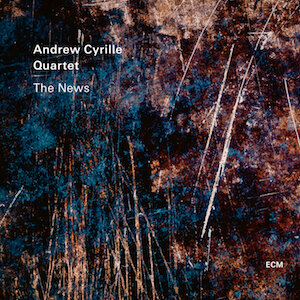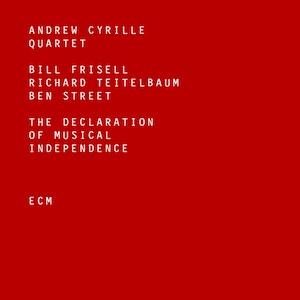Label: Red Hook Records, 2024
Personnel - Bill Frisell: electric guitar; Kit Downes: organ; Andrew Cyrille: drums.
This remarkable musical collaboration between revered guitarist Bill Frisell, versed British organist Kit Downes, and veteran drummer Andrew Cyrille results in a uniquely original work with so much going on, that only repeated listenings will make you pick up the nuances and fully absorb the vibes. Pushing beyond the usual boundaries of jazz, this innovative trio ensures that nothing in their sonic landscapes feels predictable. The 11 tracks on Breaking the Shell were recorded in New York’s Church of St. Luke in the Fields, an acoustically rich space that enhanced the resonance of the group’s sound, particularly Downes' commanding pipe organ, with its 27 stops and 1,670 pipes.
We are pitched straight into “May 4th”, an experimental effort by Frisell and Downes, containing vibrant droning in an intriguing balance between expansive guitar and grounding organ. Equally penned by the duo, “Kasei Valles”, named after a giant system of canyons on Mars, continues the experimental vibe, using sinister drones, looping riffs, and distorted walls of sound that evoke a psychedelic, nebulous atmosphere.
Downes’ “Untitled 2023” offers a more grounded composition, but with loose, exploratory drumming prying itself out of inertia. There’s shoulder-to-shoulder work by Frisell and Downes who employ harmonics and floating beams, respectively, to give the piece its peaceful resolution. Also penned by Downes, “El” is a beautiful piece where a tangible, affecting melody slides on top of a steady atmospheric texture, complemented with Cyrille’s magnificent brushwork and a guest appearance by cellist Lucy Railton. Cyrille’s skill with brushes is further showcased in his own composition, “Proximity”, a ballad filled with wonder and heartfelt emotion, akin to a meditative prayer.
Frisell, who embraces guitar reinvention at each new recording, injects wonderful impressionism in his composition “July 2nd”, delving into a gravity-defying harmonic exploration. “Two Twins” sonically paints with avant-garde tonalities, with Frisell bending notes, loosening harmonics, and fingerpicking amid tranquil waves of reverb, while Downes wraps it all in a contemporary electro bubble.
The trio also interprets two traditional European folk tunes, one from Norway and one from Hungary. The Norwegian song, “Sjung Hjerte Sjung”, grows progressively deeper, moved by Cyrille’s bright command of cymbals and snare, and filtered by a slight Southern sound that includes snippets of ambient-rock and modal music. The Hungarian piece, “Este a Székelyeknél”, takes us to hypnotic states with its quirky timbral radiations.
Throughout Breaking the Shell, the trio demonstrates a constant fascination with sound and texture, creating a transcendental work of experimental jazz that is as bewildering as it is exhilarating. It’s a must-listen for anyone who seeks fresh vibes in creative music.
Favorite Tracks:
02 - Untitled 2023 ► 04 - El ► 06 - Sjung Hjerte Sjung ► 08 - July 2nd










